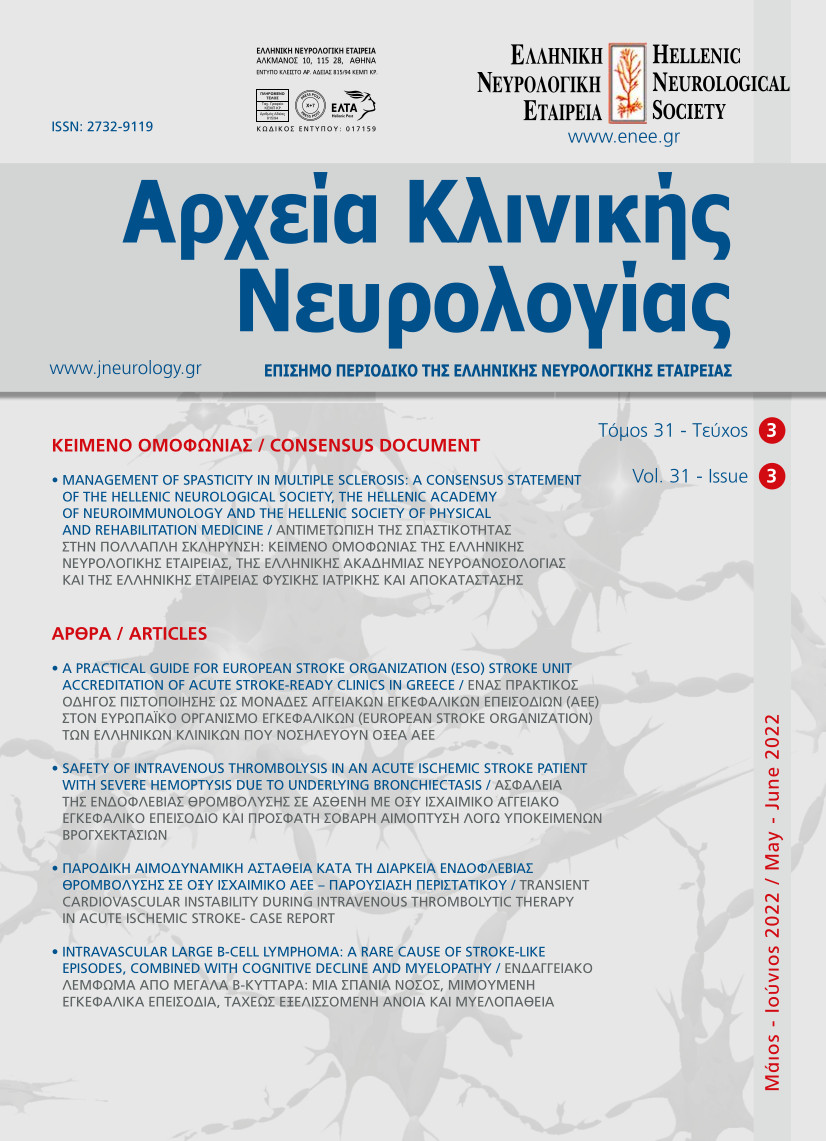ΠΑΡΟΔΙΚΉ ΑΙΜΟΔΥΝΑΜΙΚΉ ΑΣΤΆΘΕΙΑ ΚΑΤΆ ΤΗ ΔΙΆΡΚΕΙΑ ΕΝΔΟΦΛΈΒΙΑΣ ΘΡΟΜΒΌΛΥΣΗΣ ΣΕ ΟΞΎ ΙΣΧΑΙΜΙΚΌ ΑΕΕ- ΠΑΡΟΥΣΊΑΣΗ ΠΕΡΙΣΤΑΤΙΚΟΎ
Λέξεις-κλειδιά:
ισχαιμικό εγκεφαλικό, αλτεπλάση, αιμοδυναμική αστάθεια, βραδυκινίνη, αγγειοοίδημαΠερίληψη
Ασθενής 59 ετών με ιστορικό αρτηριακής υπέρτασης υπό αγωγή με αναστολέα μετατρεπτικού ενζύμου της
αγγειοτενσίνης (α-ΜΕΑ) εμφάνισε αιφνιδίως δυσαρθρία και αριστερή ημιπάρεση στα πλαίσια οξέος ισχαιμικού
εμφράκτου και αντιμετωπίστηκε με χορήγηση ενδοφλέβιας θρομβόλυσης με αλτεπλάση. Λίγο πριν την ολο-
κλήρωση της έγχυσης της θρομβολυτικής αγωγής η ασθενής εμφάνισε παροδική αιμοδυναμική αστάθεια με
βραδυκαρδία και εκσεσημασμένη υπόταση που αντιμετωπίστηκαν επιτυχώς με ενδοφλέβια χορήγησης ατρο-
πίνης, υγρών και αγγειοσυσπαστικών. Ο έλεγχος για στοματογλωσσικό αγγειοοίδημα ήταν αρνητικός. Η παρο-
δική αιμοδυναμική αστάθεια κατά τη διάρκεια ή αμέσως μετά τη θεραπεία με αλτεπλάση σε ασθενείς με οξύ
ισχαιμικό ΑΕΕ που λαμβάνουν α-ΜΕΑ υποδηλώνει αγγειοδιαστολή λόγω της συσσώρευσης της βραδυκινίνης,
τελικού προϊόντος ενός καταρράκτη πρωτεολύσεων πυροδοτούμενου από την αλτεπλάση που μπορεί επίσης
να προκαλέσει σε κάποιες περιπτώσεις στοματογλωσσικό αγγειοοίδημα. Η παρούσα περιγραφή περιστατικού
αναδεικνύει αυτή την σπάνια επιπλοκή και αναλύει υποκείμενους μηχανισμούς και τρόπους αντιμετώπισης.


